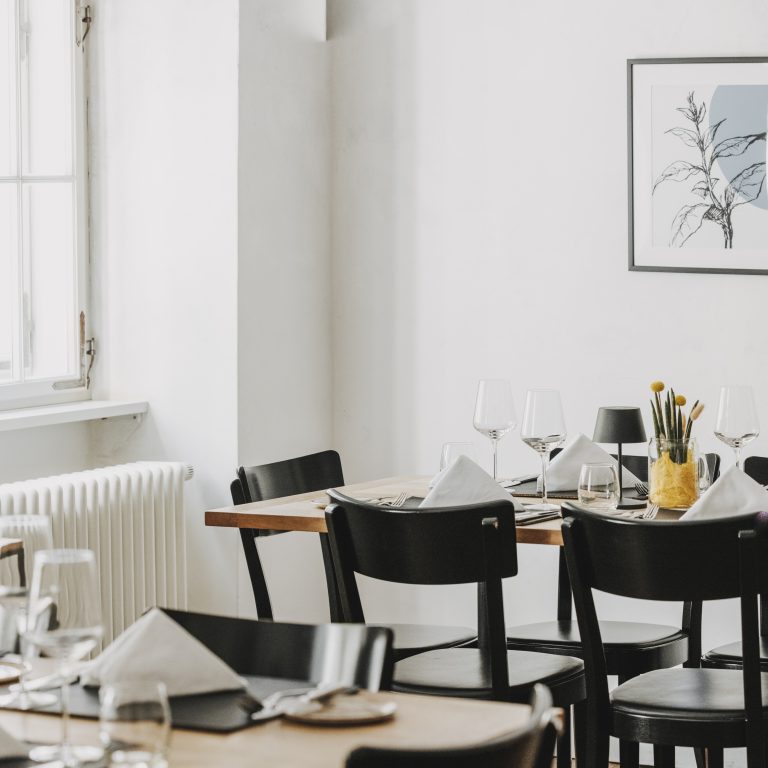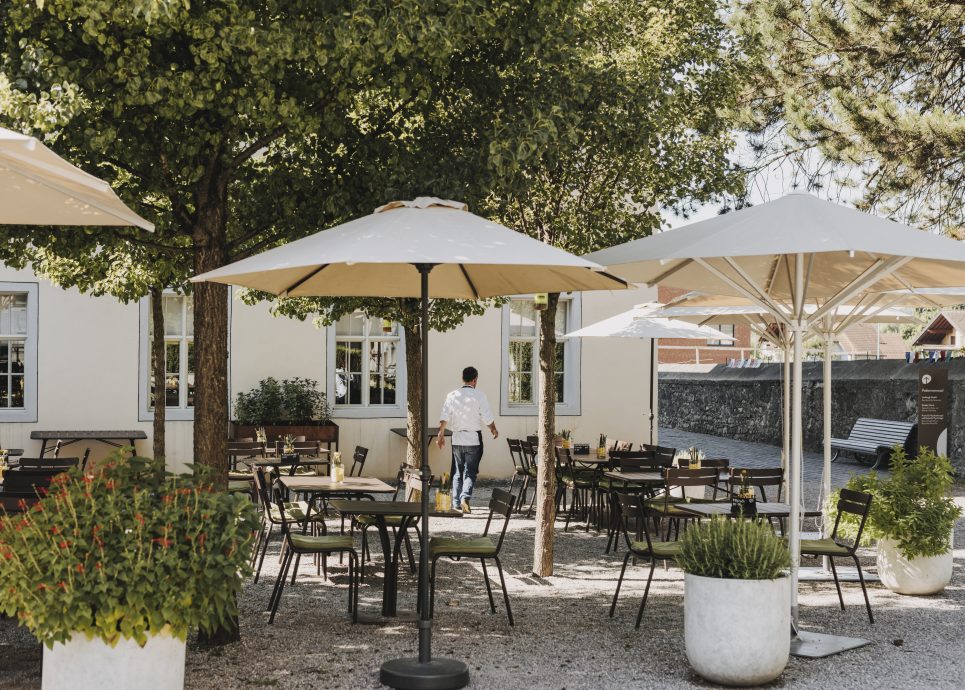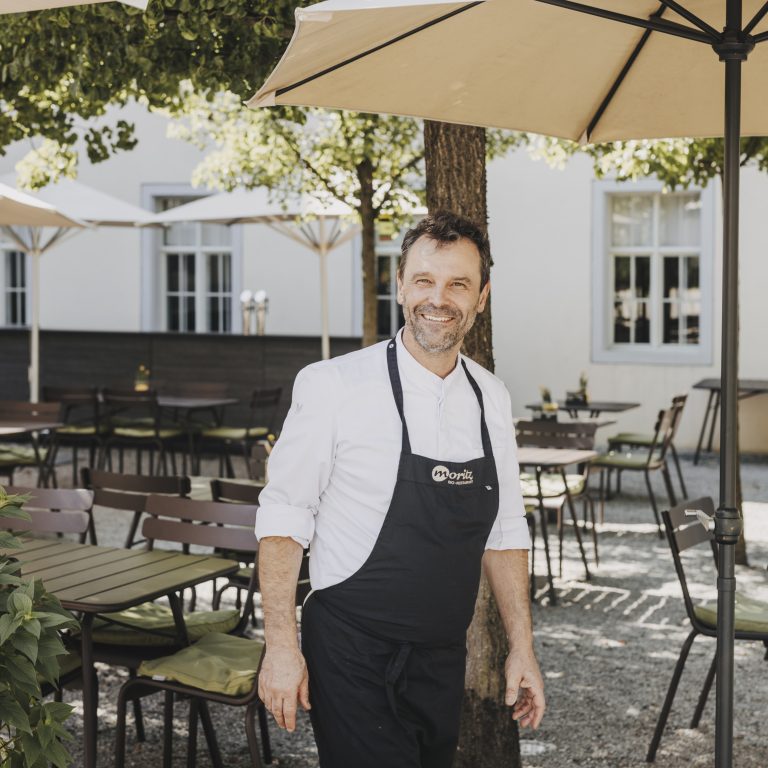


“I want to be independent of wholesalers and imports. Organic food is also healthier and tastes better.”

C Roland König, Biorestaurant Moritz, Hohenems © Angela Lamprecht / Vorarlberg Tourismus
A chef passionate about organic ingredients and attention to detail
Roland König is head chef in what is currently Vorarlberg’s only certified organic restaurant. He runs the ‘Moritz’ in Hohenems with his friends Stefanie and Marc Brugger. The historic ambience of the former Jewish school is where the three surprise their guests with unexpected creations made from regional ingredients, a convincing principle-based approach and a warmth that puts guests at ease.
TEXT: DANIELA KAULFUS
September 2022
A quiet open square, three trees, three sunshades, and, behind it, the trapezoidal building with tall latticed windows: a secluded location in the middle of Hohenems that hardly shows its eventful and moving 200-year history. The former Jewish school was extensively renovated in 2009 by a private initiative. Today, it is home to the ‘Moritz’ restaurant and the Federmann Hall – named after the Jewish teacher Moritz Federmann, who taught there for more than 50 years and who also headed the school for many years.
There is always something new to learn behind the thick walls: Roland cooks in the only certified organic restaurant in Vorarlberg – as the language spoken in the trade there has it: ‘restaurant not adjoined to a hotel’. His motive: “I want to be independent of wholesalers and imports. Organic food is also healthier and tastes better,” he says. Organic is quite popular in Belgium and Denmark. These countries are role models for the chef. “We want to support farmers who treat animals and the soil with respect. Their work is also reflected in our quality.”
Short menu, high quality
The menu of ten dishes is changed once a week. “Most of the guests are happy that the selection is small and that everything is fresh. We plan at shorter intervals than others. For example, we are unable to say what dishes we would be serving at a wedding until two weeks before the event.” The tight schedule is an incentive to continue to learn for the 50-year-old. “New dishes and new guests are turning up all the time. It’s just so heart-warming to see it when their eyes shine. If only everyone had that in their jobs!”
The chef gladly accepts the additional effort associated with his work. “As a direct purchaser, I visit farmers two to three times a week. It’s always surprising what they give me.” Roland suddenly drops everything and disappears from the kitchen. He returns smiling and holding a honeydew melon. With a large blade, yet almost lovingly, he cuts it into bite-sized pieces and hands them out on a plate for tasting. The melon is aromatic, sweet and juicy – ripened under the Vorarlberg sun at the Breuss organic farm in Röthis.
The fruity pleasure is accompanied by the sound of gentle bubbling. A tomato ragout has been simmering in a small pot for six hours. “Sugar caramelised in olive oil with diced onions and tomatoes and vegetable stock added later,
which is brought to the boil and then reduced,” Roland says, setting out the steps. He is preparing a vegetarian dish that his guests love and is ‘easy to recreate’. This last sentence piques the small group’s interest. “Chickpea-based grain patty with vegetables, tomato ragout and fresh cabbage with vinegar-oil dressing. Even died-in-the-wool meat eaters think it’s great,” Roland says. He should know: 140 meals a day leave the large and bright kitchen where three professionals work to feed the guests.
Vorarlberg has everything to offer
Roland once headed large kitchen teams. For Seidl Catering, for instance, he fed thousands attending the Olympic Games in Sochi and the World Gymnaestrada international gymnastics festival in Vorarlberg in 2019. That is where he met Marc Brugger and his wife Stefanie. The two career changers bring their organisational and marketing know-how to the ‘Moritz’. The three constitute a perfectly coordinated team – with organic being the common denominator.
His time abroad, including in Los Angeles, has made Roland really appreciate Vorarlberg. “People in America hardly have any holidays, there’s no social system – at least there wasn’t when I was there.” Well, that is the short version. “You’ve got everything here. There aren’t many other places in the world that provide as many opportunities in as compact a fashion as Vorarlberg does.” He likes to spend his free time out and about in the mountains, heading towards Eichenberg with its view across Lake Constance or in Montafon, where he grew up. And, when he is not at work, he likes to bake or cook at home with friends. “It’s ideal if you enjoy doing the same things at home that you do at work.” He naturally also takes care to use regional ingredients there as well.
At the ‘Moritz’, Roland works with products from Lisilis Biohof, Lukas Breuss from Röthis, Stefan and Caprice Innauer from Eichenberg, Sieglinde and Christian Breuss from Übersaxen, from the Berlinger Ziegenhof and other renowned pioneers of organic farming in Vorarlberg. The herbs from the restaurant garden, which he is now showing us, are also organic: Roland runs his fingers through the lush greenery in the long raised beds. “Lovage, one of my favourite herbs,” he said plucking off a few leaves to pass them around. The aroma is reminiscent of soup seasoning from childhood. “It’s so beautifully old-fashioned,” Roland confirms with a laugh. Olive and curry herbs and mountain and purple basil also thrive in addition to thyme, sage and rosemary. They are served fresh, dried or in the shape of syrup at the ‘Moritz’. “I like the idea of bringing the garden to the plate. The aromas fill the nose when the herbs are placed on the warm dishes. Then something crunchy needs to go on top. All the senses are stimulated that way.” And hunger begins to stir …
So it is off to the kitchen, to the meat mincer: Roland passes soaked chickpeas, cooked wheat, onions, garlic and herbs through. The vegetable-cereal sausage drops into a bowl. He takes one handful of the mass at a time to shape little patties. He places these in the pan heated with oil and fries them until they are golden on both sides. It is entirely credible that the wonderful aroma also makes meat lovers happy.
Unusual combinations
Be it meat or vegetables: the kitchen at the ‘Moritz’ always uses everything. “It’s important to me to maintain the cycle in the kitchen. And to surprise guests. For example, using a dried carrot peel for garnish – things that others throw away.” Another of the chef’s rules: there has to be something crunchy, sour, sweet. “It’s perfect when a variety of components are combined into a single mouthful. I love pairing foods in ways that most would assume would not go together.” Roland has, for example, previously paired pork belly with couscous and radishes on the menu – where the meat has been cooked for 24 hours, pressed, cut cold and fried. “Guests who usually do not eat pork have returned especially for that,” he says, laughing as he reaches for a head of cabbage. With light movements, he drags it across the slicer and marinates the strips of cabbage with vinegar and oil.
He ladles tomato ragout on to a large plate, places three vegetable patties on top and garnishes that with the coleslaw, fresh herbs and toasted croutons. The different consistencies, aromas and flavours on the plate – and even better – on the fork are completely convincing: you will not want to recreate the recipe, you will simply have to!